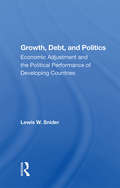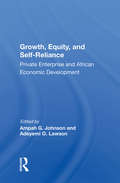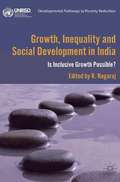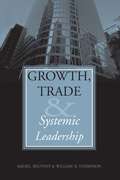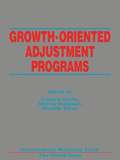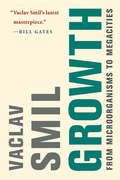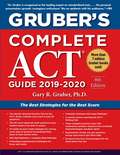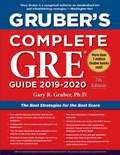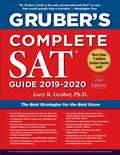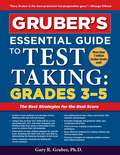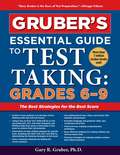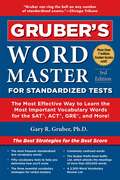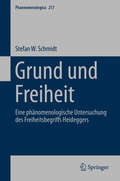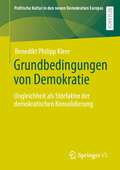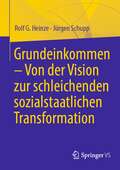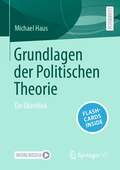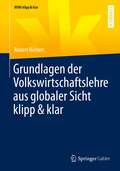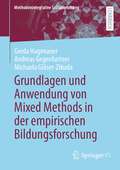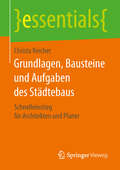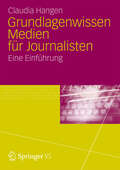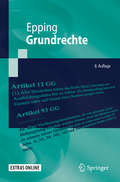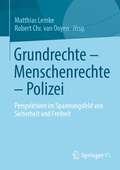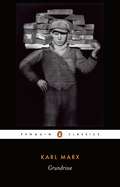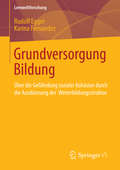- Table View
- List View
Growth, Debt, And Politics: Economic Adjustment And The Political Performance Of Developing Countries
by Lewis W. SniderThis book addresses the question of how political capacity of the government of a developing country affects its ability to implement structural adjustments in its economy in response to external pressures. It builds on the inductive foundation of comparative case studies and speculative insights.
Growth, Equity, And Self-reliance: Private Enterprise And African Economic Development
by Ampah G. Johnson Adeyemi O. LawsonThis book explores what is, for many African countries, a new and controversial policy of relying on private actors rather than on government organizations to foster economic growth and development. The contributors explore key issues such as the impact of private enterprise on the development process, small- and medium-sized businesses as a vehicle for growth, and strategies for the expansion of markets and trade. The contributors analyze the historical, social, cultural, and economic obstacles to the development of private enterprise in Africa; the roles of government, women, and business organizations; access to capital and the function of financial institutions; private initiative and agriculture; the use of skilled and semi-skilled labor; and technology transfer. Arguing that private sector forces are crucial to African socioeconomic development, the contributors recommend economic policy reform, establishment of more private enterprises, and encouragement of new domestic and foreign investment.
Growth, Inequality and Social Development in India
by R. NagarajWith six essays exploring different aspects of economic growth, poverty, inequality and social security, this book offers a critical perspective on India's development experience since independence. Incisive and empirically rich, the book opens up new vistas in development discourse and informs current policy debates.
Growth, Trade, and Systemic Leadership
by Rafael Reuveny William R. ThompsonUsing a "lead economy" approach, Reuveny and Thompson link question about the global trade system to debates about hegemonic stability and the balance of power in world politics. By focusing on economic growth, protectionism, and trade, they surpass hegemonic stability interpretations of international politics to explain not only how hegemons maintain political order, but also the source of hegemonic/systemic leadership, the rise and decline of leadership over time, and the role of system leaders in generating worldwide economic growth and international political economic order. Rafael Reuveny is Associate Professor in the School of Public and Environmental Affairs at Indiana University. William R. Thompson is Professor of Political Science at Indiana University.
Growth-Oriented Adjustment Programs
by Morris Goldstein Mohsin Khan Vittorio CorboA report from the International Monetary Fund.
Growth: From Microorganisms to Megacities (The\mit Press Ser.)
by Vaclav SmilA systematic investigation of growth in nature and society, from tiny organisms to the trajectories of empires and civilizations.Growth has been both an unspoken and an explicit aim of our individual and collective striving. It governs the lives of microorganisms and galaxies; it shapes the capabilities of our extraordinarily large brains and the fortunes of our economies. Growth is manifested in annual increments of continental crust, a rising gross domestic product, a child's growth chart, the spread of cancerous cells. In this magisterial book, Vaclav Smil offers systematic investigation of growth in nature and society, from tiny organisms to the trajectories of empires and civilizations. Smil takes readers from bacterial invasions through animal metabolisms to megacities and the global economy. He begins with organisms whose mature sizes range from microscopic to enormous, looking at disease-causing microbes, the cultivation of staple crops, and human growth from infancy to adulthood. He examines the growth of energy conversions and man-made objects that enable economic activities—developments that have been essential to civilization. Finally, he looks at growth in complex systems, beginning with the growth of human populations and proceeding to the growth of cities. He considers the challenges of tracing the growth of empires and civilizations, explaining that we can chart the growth of organisms across individual and evolutionary time, but that the progress of societies and economies, not so linear, encompasses both decline and renewal. The trajectory of modern civilization, driven by competing imperatives of material growth and biospheric limits, Smil tells us, remains uncertain.
Gruber's Complete ACT Guide 2019-2020: The Best Strategies For The Best Score
by Gary GruberThe ultimate guide to improving ACT scores with practical strategies and examples, comprehensive subject reviews, practice tests and explanations, and much more! Every college-bound student wants the best test scores possible. But with a wide variety of test-prep books available, how do you know you’re choosing the right one to help you most? Fortunately, that just happens to be Dr. Gary Gruber’s life’s work: rather than rote memorization of individual problem solutions, his Gruber Method teaches adaptive strategies to think about test problems as categories, allowing students to solve thousands of questions quickly and effectively. In Gruber’s Complete ACT Guide 2019-2020, you’ll find all the resources you need to develop the test-taking skills and critical-thinking strategies that are proven to increase your test score. With 33 essential strategies illustrated with examples, three complete practice tests, and much more, you’ll see how, for over thirty years, the Gruber Method has helped millions of students master the ability to solve any ACT problem—even the most difficult—easily and efficiently. So read Gruber’s Complete ACT Guide 2019-2020, study its lessons, and watch your ACT score increase and your future possibilities expand. Also included in Gruber’s Complete ACT Guide 2019-2020: The World’s Shortest Practice Test for the ACT® Exam: estimate your score in only 20 questions!The 101 most important math questions every student needs to be able to answerNineteen simple-to-learn math strategies for solving every type of question by breaking them down to their easiest formsMini Math Refresher + Complete Math RefresherNine Reading Comprehension Strategies for focus and clarityComplete Grammar and Usage RefresherA special section covering the ACT® Writing TestThree complete practice tests with explanatory answersExplanations of why you got questions wrong—plus how to get them rightExclusive four-hour study program for the week before the test
Gruber's Complete GRE Guide 2019-2020
by Gary GruberThe ultimate guide to improving GRE scores with practical strategies and examples, comprehensive subject reviews, practice tests and explanations, and much more! Every college-bound student wants the best test scores possible. But with a wide variety of test-prep books available, how do you know you’re choosing the right one to help you most? Fortunately, that just happens to be Dr. Gary Gruber’s life’s work: rather than rote memorization of individual problem solutions, his Gruber Method teaches adaptive strategies to think about test problems as categories, allowing students to solve thousands of questions quickly and effectively. In Gruber’s Complete GRE Guide 2019-2020, you’ll find all the resources you need to develop the test-taking skills and critical-thinking strategies that are proven to increase your test score. With essential strategies illustrated with examples, four practice tests, information on how GRE questions are created, and much more, you’ll see how, for over thirty years, the Gruber Method has helped millions of students master the ability to solve any problem—even the most difficult—easily and efficiently. So read Gruber’s Complete GRE Guide 2019-2020, study its lessons, and watch your GRE score increase and your future possibilities expand. Also included in Gruber’s Complete GRE Guide 2019-2020: The World’s Shortest Practice Test for the GRE® Exam: estimate your score in only 20 questions!A diagnostic test to reveal your strengths and weaknesses The 101 most important math questions every student needs to be able to answerNineteen simple-to-learn Math Strategies for solving every type of question by breaking them down to their easiest formsMini Math Refresher + Complete Math RefresherGuides to help you master the GRE® basics Four practice tests with explanatory answersExplanations of why you got questions wrong—plus how to get them rightExclusive four-hour study program for the week before the test
Gruber's Complete SAT Guide 2019-2020
by Gary GruberThe ultimate guide to improving SAT scores with practical strategies and examples, comprehensive subject reviews, practice tests and explanations, and much more! Every college-bound student wants the best test scores possible. But with a wide variety of test-prep books available, how do you know you’re choosing the right one to help you most? Fortunately, that just happens to be Dr. Gary Gruber’s life’s work: rather than rote memorization of individual problem solutions, his Gruber Method teaches adaptive strategies to think about test problems as categories, allowing students to solve thousands of questions quickly and effectively. In Gruber’s Complete SAT Guide 2019-2020, you’ll find all the resources you need to develop the test-taking skills and critical-thinking strategies that are proven to increase your test score by as much as 600 points. With 37 essential strategies illustrated with examples, two complete practice tests, and much more, you’ll see how, for over thirty years, the Gruber Method has helped millions of students master the ability to solve any SAT problem—even the most difficult—easily and efficiently So read Gruber’s Complete SAT Guide 2019-2020, study its lessons, and watch your SAT score increase and your future possibilities expand. Also included in Gruber’s Complete SAT Guide 2019-2020: The World's Shortest Practice Test for the SAT® Exam: estimate your score in only 20 questions!A diagnostic test to reveal your strengths and weaknesses The 101 most important math questions every student needs to be able to answer19 simple-to-learn math strategies for solving every type of question by breaking them down to their easiest formsMini Math Refresher + Complete Math Refresher13 Verbal Strategies to improve your reading skill and understandingThe Gruber Prefix-Root-Suffix List, which unlocks the meanings of more than 150,000 words100 Tests to Strengthen Your VocabularySubject-specific guides to help you master the SAT® basics Two complete practice tests with explanatory answers keyed to the acclaimed Gruber Strategies and Basic SkillsExplanations of why you got questions wrong—plus how to get them rightExclusive four-hour study program for the week before the test
Gruber's Essential Guide to Test Taking: The Best Strategies For The Best Score
by Gary GruberThe ultimate guide to helping your child succeed on tests both now and as they grow up, with practical strategies and examples, comprehensive subject reviews, practice exams and explanations, and much more! All parents want their children to be as successful as possible and to reach their fullest potential, and, in today&’s education climate, test-taking is more important to a student&’s success and growth than ever before. So how can you make sure your child is as well-prepared as possible? Fortunately, that just happens to be Dr. Gary Gruber&’s life&’s work. For over thirty years, his Gruber Method has taught millions of students the critical-thinking skills needed to succeed in the modern education system. Using adaptive strategies for thinking about test problems as categories, rather than rote memorization of individual answers, Dr. Gruber has unlocked the essential test-taking skills any child can use to succeed on any test, any time. For parents and teachers who want to help their children learn and understand the strategies needed in all test-taking areas, Gruber's Essential Guide to Test Taking: Grades 3-5 will help your child expand their knowledge, develop their test-taking confidence, and realize their true potential. Featured topics in Gruber's Essential Guide to Test Taking: Grades 3-5 include: Guides to how students can develop critical thinking skills that will last foreverUnique test on How Your Child will do on the upcoming SAT, ACT, and what strategies and thinking skills they need to internalize in this book to achieve their full potential.Information to help children prepare for specific tests, including the PSAT, SAT, ACT, and GRE by internalizing the thinking strategies in this bookClear, consistent methods for finding the correct answersKey mathematical laws, ideas, and secrets that students should knowEssential language and grammar skills, plus vocabulary-word listsTried-and-true reading-comprehension techniquesEasy, efficient methods for making children less nervous about testsPractical strategies for helping children achieve their fullest potential So pick up a copy of Gruber's Essential Guide to Test Taking: Grades 3-5, study its lessons with your child, and watch them grow and succeed.
Gruber's Essential Guide to Test Taking: The Best Strategies For The Best Score
by Gary GruberThe ultimate guide to helping your child succeed on tests both now and as they grow up, with practical strategies and examples, comprehensive subject reviews, practice exams and explanations, and much more! All parents want their children to be as successful as possible and to reach their fullest potential, and, in today&’s education climate, test-taking is more important to a student&’s success and growth than ever before. So how can you make sure your child is as well-prepared as possible? Fortunately, that just happens to be Dr. Gary Gruber&’s life&’s work. For over thirty years, his Gruber Method has taught millions of students the critical-thinking skills needed to succeed in the modern education system. Using adaptive strategies for thinking about test problems as categories, rather than rote memorization of individual answers, Dr. Gruber has unlocked the essential test-taking skills any child can use to succeed on any test, any time. For parents and teachers who want to help their children learn and understand the strategies needed in all test-taking areas, Gruber's Essential Guide to Test Taking: Grades 6-9 will help your child expand their knowledge, develop their test-taking confidence, and realize their true potential. Featured topics in Gruber's Essential Guide to Test Taking: Grades 6-9 include: Guides to how students can develop critical thinking skills that will last foreverUnique test on How Your Child will do on the upcoming SAT, ACT, and what strategies and thinking skills they need to internalize in this book to achieve their full potential.Information to help children prepare for specific tests, including the PSAT, SAT, ACT, and GRE by internalizing the thinking strategies in this bookClear, consistent methods for finding the correct answersKey mathematical laws, ideas, and secrets that students should knowEssential language and grammar skills, plus vocabulary-word listsTried-and-true reading-comprehension techniquesEasy, efficient methods for making children less nervous about testsPractical strategies for helping children achieve their fullest potential So pick up a copy of Gruber's Essential Guide to Test Taking: Grades 6-9, study its lessons with your child, and watch them grow and succeed.
Gruber's Word Master for Standardized Tests: The Most Effective Way to Learn the Most Important Vocabulary Words for the SAT, ACT, GRE, and More!
by Gary GruberThe ultimate guide to improving your vocabulary and all standardized test scores with comprehensive definition reviews and breakdowns, practical language strategies and examples, fifty practice tests and explanations, and much more! Every college-bound student wants the best test scores possible. Fortunately, that just happens to be Dr. Gary Gruber’s life’s work. For over thirty years, his Gruber Method has taught millions of students to expand their vocabulary and language skills and to improve their scores (for example, increasing SAT scores by as much as 600 points) through adaptive strategies for thinking about test problems as categories, rather than rote memorization of individual answers.Gruber’s Word Master for Standardized Tests is the most thorough vocabulary-improvement resource available today. In addition to including more tools and lists than the competition, the guide includes a wide range of useful information to help students hone and sharpen their vocabulary and language skills, such as: The most important words used on all standardized tests Prefixes and roots that denote the same meaning or feelingCommonly confused wordsThe 291 most frequent test words50 vocabulary tests with answersPrefixes and Roots that decode more that 200,000 words on testsThe Gruber Breakthrough Word StrategiesThe Gruber 2300 Vocabulary Word Review List So read Gruber’s Word Master for Standardized Tests, study its lessons, and watch your test scores increase and your future possibilities expand.
Grund und Freiheit
by Stefan W. SchmidtIn der vorliegenden Studie geht der Autor den mannigfaltigen Zusammenhängen von Gründung und Begründung in der Welt nach, um mit Martin Heidegger zu zeigen, dass all diese Zusammenhänge Freiheit voraussetzen, aus Freiheit hervorgehen oder doch zumindest freiheitsbedingt sind. Die Analyse des ontologischen Freiheitsbegriffs Heideggers nimmt so die Gestalt einer phänomenologischen Destruktion von ,,Grund" an. Der Fokus des Buches liegt auf Heideggers tatsächlichem Gebrauch des Begriffs ,,Freiheit". Ausgangspunkt der Untersuchung ist das Diktum ,,Die Freiheit ist der Grund des Grundes". Dieser Satz fällt in Heideggers ,,metaphysische Periode", die sich auf den Zeitraum von 1928 bis 1930 beschränkt und in der er versucht, einen positiven Begriff von Metaphysik, eine Metaphysik des Daseins, zu entwerfen. Zur Aufschlüsselung dieses Diktums konzentriert sich die Untersuchung daher auf eben jenen Zeitraum. Im ersten Kapitel wird der Begriff des Grundes systematisch und philosophiehistorisch untersucht, um unsere Praxis des Begründens offenzulegen und aufzuzeigen, wie diese Praxis bereits den Begriff von Welt präsupponiert. Das zweite Kapitel widmet sich Heideggers positivem Verständnis von Freiheit und weist nach, wie die beiden Begriffe ,,Grund" und ,,Freiheit" mittels des Weltbegriffs miteinander verwoben sind. Das dritte Kapitel zieht ein Resümee und setzt die Ergebnisse in einen breiteren phänomenologischen Kontext, der nicht allein auf Heidegger beschränkt bleibt. Das vierte und letzte Kapitel setzt sich mit den ethischen Implikationen von Heideggers ontologischem Freiheitsbegriff auseinander.
Grundbedingungen von Demokratie: Ungleichheit als Störfaktor der demokratischen Konsolidierung (Politische Kultur in den neuen Demokratien Europas)
by Benedikt Philipp KleerIn den 1990er und frühen 2000er Jahren wurde der ökonomische Schock in Ostmitteleuropa nach der Transformation noch geduldet, mit dem Beitritt zur EU wurde aber deutlich, dass das erwartete Wohlstandsniveau nicht erreicht wird. Trotzdem konnten die politischen Systeme Ostmitteleuropas als konsolidiert gelten. Die jüngsten Entwicklungen in Ostmitteleuropa sind dagegen beunruhigend: In Ungarn wie Polen ist sichtbar, dass anti-liberale Parteien mit dem liberalen Konsens brechen. Diese Parteien greifen das Dilemma der erwarteten Wohlstandsentwicklung auf und weisen der liberalen Demokratie die Schuld an diesem zu. Das Ziel dieser Arbeit ist es daher zu beurteilen, inwieweit sich Effekte zwischen den Ebenen politischer Unterstützung zeigen und wie Ungleichheit auf die politische Unterstützung in konsolidierten liberalen Demokratien in Ostmitteleuropa wirkt. Für das Ziel dieser Arbeit werden die Ursprünge der Theorien der politischen Unterstützung, der politischen Kultur, der empirischen Demokratieforschung und der Konsolidierungstheorie miteinander verbunden. Durch die Analyse von drei Wellen des European Social Survey (2004, 2012 und 2018) ist es möglich, die Entwicklung im Zeitverlauf zu betrachten
Grundeinkommen – Von der Vision zur schleichenden sozialstaatlichen Transformation
by Jürgen Schupp Rolf G. HeinzeDie vorliegende Publikation erweitert konstitutiv das Diskursfeld zum Thema Grundeinkommen, lotet die Möglichkeiten einer Einführung sowie Chancen und Risiken ab. Obwohl alle visionären Vorschläge zum Bedingungslosen Grundeinkommen (BGE) zumindest in demokratisch verfassten Wohlfahrtsstaaten bislang politisch nicht umgesetzt wurden, wurde die Frage nach der Umsetzung bzw. den Gelingensbedingungen und der Identifizierung möglicher Blockaden nur am Rande behandelt. Auch jüngste Veröffentlichungen zu einem BGE weisen diese politisch-institutionelle „Blindheit“ auf und thematisieren zu wenig die Gründe für das bisherige Scheitern. Ohne eine Überführungsstrategie wird die Idee in Deutschland aber aufgrund einer solchen Implementierungsnaivität scheitern. Im Buch wird deshalb der Diskussionsstand zum Grundeinkommen insofern weiterentwickelt, dass eine Einbindung in wohlfahrtsstaatliche Entwicklungsverläufe und aktuelle Herausforderungen für die „Sicherung der sozialen Sicherung“ vorgenommen wird. Zudem wird anknüpfend an den „stillen“ Wandel zum sozialinvestiven Staat eine sozialwissenschaftliche Einordnung bislang visionär erscheinender garantistischer Elemente eines Grundeinkommensmodells vorgenommen.
Grundlagen der Politischen Theorie: Ein Überblick
by Michael HausDas Lehrbuch verbindet eine bewährte Orientierung an Schlüsselautor*innen mit einer innovativ-systematischen Darstellungsweise. Mit dem Verständnis von Politischer Theorie als Systematisierung der Rechtfertigung und Kritik politischer Verhältnisse wird ein weiter, aber zugleich eingegrenzter Fokus gesetzt. Im ersten Teil („Klassische Perspektiven“) werden jeweils zwei Figuren der politischen Ideengeschichte kapitelweise gegenübergestellt. Auch im zweiten Teil („Zeitgenössische Perspektiven“) werden zentrale Argumentationsansätze mittels einer vergleichenden Betrachtung von Theoretiker*innen erschlossen. Darüber hinaus werden Forderungen nach einer grundlegenden Neuausrichtung der Politischen Theorie behandelt. Eine übergreifende Klammer bilden Reflexionen zu den Konzepten „Macht“, „Gerechtigkeit“ und „Demokratie“.
Grundlagen der Volkswirtschaftslehre aus globaler Sicht klipp & klar (WiWi klipp & klar)
by Robert RichertDiese Einführung beginnt mit der Volkswirtschaftlichen Gesamtrechnung, die einen Überblick über wichtige ökonomische Aggregate wie z. B. das Bruttoinlandsprodukt gibt. Darüber hinaus werden ergänzend auch Wohlstands-, Armuts- und Glücksindizes vorgestellt. Eine Analyse der sozioökonomischen Lage in Deutschland verdeutlicht die Dramatik der demographischen Entwicklung, wenn die Generation der Babyboomer in den Ruhestand gehen wird. Zudem wird in diesem Buch auch die sozioökonomische Situation anderer Länder und Kontinente berücksichtigt, um die internationale Dimension der Volkswirtschaftslehre zu verstehen. Unter anderem werden Bevölkerungsprobleme, Einkommens- und Vermögensungleichheiten sowie zu erwartende Verteilungskonflikte angesprochen. Anschließend erläutert der Autor Historie und Funktion der Sozialen Marktwirtschaft in Deutschland, bevor er einen Überblick über das Magische Viereck gibt. Den Abschluss bilden verfassungs- und informationsökonomische Ausführungen sowie ein internationaler Vergleich der Innovationsfähigkeit und -kraft, der einen Blick in die Zukunftsfähigkeit einer Volkswirtschaft erlaubt. Das Buch richtet sich an Studierende wirtschaftswissenschaftlicher Studiengänge an Universitäten, Hochschulen angewandter Wissenschaften und Dualen Hochschulen. Es ist jedoch auch zum Selbststudium geeignet und für Praktiker aus der Wirtschaft sowie für interessierte Laien gut zu verstehen, da in dieser Einführung auf theoretische Modelle verzichtet wird. Am Ende jedes Kapitels sorgen Zusammenfassungen für Prägnanz, Wiederholungsfragen, Aufgaben und Lösungen für die Festigung der Inhalte.
Grundlagen und Anwendung von Mixed Methods in der empirischen Bildungsforschung (Methodenintegrative Sozialforschung)
by Andreas Gegenfurtner Gerda Hagenauer Michaela Gläser-ZikudaDas Buch gibt einen Einblick in Mixed Methods in der empirischen Bildungsforschung. Der Fokus liegt auf der Kombination von qualitativen und quantitativen Forschungszugängen, die aktuell sehr prominent in der empirischen Bildungsforschung diskutiert werden.Die Inhalte sind gleichermaßen für Studierende wie Forscher:innen verständlich aufbereitet, die sich bisher noch nicht mit Mixed Methods beschäftigt haben. Daher werden die methodologischen Grundlagen kurz beschrieben (mit Verweisen auf Vertiefungsliteratur) und mit konkreten Beispielen aus der empirischen Bildungsforschung verknüpft.
Grundlagen wissenschaftlichen Arbeitens in der Polizei: Wissenschaftliches Denken, Arbeiten, Handeln, Forschen und Kommunizieren
by Swen Körner Mario StallerDieses Lehrbuch bietet einen umfassenden Überblick über das Thema der Wissenschaftlichkeit in der Polizei. Zwei Perspektiven bilden dabei den Kern des Werkes. Die wissenschaftliche Perspektive stellt den aktuellen Erkenntnisstand im Kontext der Polizei umfassend dar. Dabei wird der Umgang der Polizei mit Wissenschaft thematisiert und Wissenschaft mit, über und durch die Polizei in den Blick genommen.Die praktische Perspektive fokussiert auf den/die handelnde Polizist*in. Forschende Polizist*innen geben einen praxisnahen Einblick in wissenschaftliches Denken als Grundlage ihrer Polizeiarbeit. Damit beansprucht das Buch das Standardwerk für die Wissenschaftlichkeit für die Polizei zu sein. Mit dieser Perspektive richtet es sich an Polizeipraktiker*innen, Entscheider*Innen und Wissenschaftler*innen, um einen praxisnahen, erkenntnisfundierten und zugleich verständlichen Zugang zu wissenschaftlichem Denken, Arbeiten, Forschen und Kommunizieren innerhalb der Polizei zu schaffen. Für Polizeistudierende bietet das Werk Schritt-für-Schritt Anleitungen, um innerhalb der Polizei zu Forschen und das Studium erfolgreich zu beenden.Durch das Vereinen der wissenschaftlichen und praktischen Perspektive in der Polizeipsychologie bringt das Handbuch aktuelle Forschungsergebnisse mit- und gegeneinander ins Gespräch.
Grundlagen, Bausteine und Aufgaben des Städtebaus: Schnelleinstieg für Architekten und Planer (essentials)
by Christa ReicherChrista Reicher gibt einen Überblick über die Grundbegriffe und die historischen Phasen des Städtebaus sowie unterschiedliche Theorien. Das städtische Gefüge setzt sich aus verschiedenen Bausteinen und Nutzungen zusammen, die erläutert und in ihrer Bedeutung für qualitätsvollen Städtebau eingeschätzt werden. Die verschiedenen Philosophien beim städtebaulichen Entwerfen als produkt- und prozessorientierte Herangehensweisen werden dargestellt. Eine Aufbereitung der aktuellen Aufgabenfelder illustriert die Relevanz von Städtebau in der Planungspraxis, der Lehre und der Forschung.Die Autorin: Christa Reicher ist Professorin und Leiterin des Lehrstuhls und Instituts für Städtebau an der Fakultät für Architektur der RWTH Aachen. Sie ist außerdem Gründerin eines Planungsbüros mit Sitz in Aachen und Dortmund.
Grundlagenwissen Medien für Journalisten
by Claudia HangenDer Band bietet eine kompakte Einführung in die Grundlagen der Medien insbesondere für Studierende mit dem Berufswunsch Journalismus und für Berufseinsteiger. Er behandelt die verschiedenen Ausbildungswege ebenso wie medienethische Fragen, ökonomische, medienrechtliche und medienpolitische Grundlagen. Ein besonderer Schwerpunkt liegt auf den Veränderungen im Journalismus und den Medien durch Internet, Twitter, Facebook & Co, was die Autorin am Beispiel der Jasmin-Revolution in der arabischen Welt und der Krisen der New Economy 2001 und der Finanzkrise 2008/2009 veranschaulicht.
Grundrechte (Springer-Lehrbuch)
by Volker EppingDieses Lehrbuch richtet sich an Studierende, die entweder einen Einstieg in den Bereich der Grundrechte suchen oder aber die Grundrechte zwecks Vorbereitung auf die Übungen bzw. das Staatsexamen wiederholen möchten. Das Werk ist konsequent auf die Anforderungen zugeschnitten, mit denen Studierende in Klausuren, Haus- und Studienarbeiten konfrontiert werden. Alle Grundrechte mitsamt ihren europarechtlichen Bezügen sowie die prüfungsrelevanten Grundzüge der Verfassungsbeschwerde werden ausgehend vom Verfassungstext systematisch erschlossen. Die allgemeinen Grundrechtslehren, die in ihrer Abstraktheit gerade für den Einsteiger häufig nur schwer verständlich sind, werden nicht "vor die Klammer" gezogen, sondern am Beispiel einzelner Grundrechte behandelt. Zum besseren Verständnis gibt das Buch außerdem die zentralen Entscheidungen des BVerfG in den relevanten Auszügen wieder. Beispielsfälle, deren Lösungen über das Internet bereitgestellt werden, sowie Zusammenstellungen typischer Klausurprobleme runden das Lehrbuch ab.
Grundrechte – Menschenrechte – Polizei: Perspektiven im Spannungsfeld von Sicherheit und Freiheit
by Matthias Lemke Robert Chr. van OoyenDie Polizei ist wegen ihrer präventiven und repressiven Aufgaben im Bereich von Gefahrenabwehr und Strafverfolgung eine für moderne Gesellschaften wichtige Institution. Da sie in besonderen Situationen zum Einsatz kommt und tief in die Grundrechte der Bürger*innen eingreifen darf, steht sie zugleich unter kritischer Beobachtung. In den Beiträgen wird „Polizei“ vor dem Hintergrund dieses Spannungsfelds von Sicherheit und Freiheit analysiert. Der Band ist Martin H. W. Möllers als Festschrift anlässlich seines 70. Geburtstages gewidmet.
Grundrisse: Foundations of the Critique of Political Economy
by Karl MarxWritten during the winter of 1857-8, the Grundrisse was considered by Marx to be the first scientific elaboration of communist theory. A collection of seven notebooks on capital and money, it both develops the arguments outlined in the Communist Manifesto (1848) and explores the themes and theses that were to dominate his great later work Capital. Here, for the first time, Marx set out his own version of Hegel's dialectics and developed his mature views on labour, surplus value and profit, offering many fresh insights into alienation, automation and the dangers of capitalist society. Yet while the theories in Grundrisse make it a vital precursor to Capital, it also provides invaluable descriptions of Marx's wider-ranging philosophy, making it a unique insight into his beliefs and hopes for the foundation of a communist state.
Grundversorgung Bildung
by Rudolf Egger Karina FernandezDemographische Veränderungen und geographische Wanderungsbewegungen führen zu zahlreichen sozialen und lebensweltlichen Spannungen zwischen städtischen Zentren und ländlichen Gebieten. Die Folgen dieses Wandels sind in zahlreichen peripheren Regionen bereits deutlich zu spüren. In diesem Buch werden die Effekte von Abwanderungsprozessen und Gegensteuerungsmaßnahmen durch Bildung anhand eines Modellfalls beschrieben. Dabei werden die Gestaltungskräfte von Weiterbildung für Prozesse der Regionalentwicklung, der Schaffung sozial-regionaler Ankerpunkte und der Daseinsvorsorge für Menschen analysiert.
